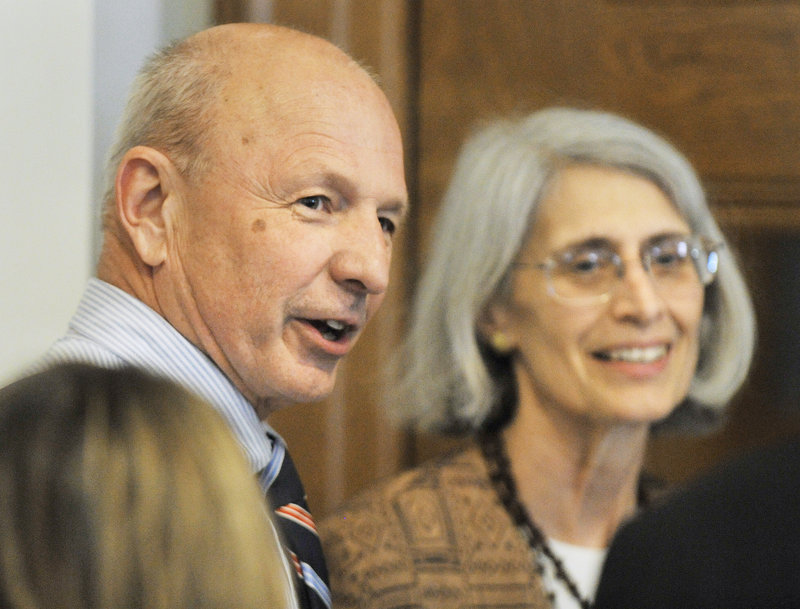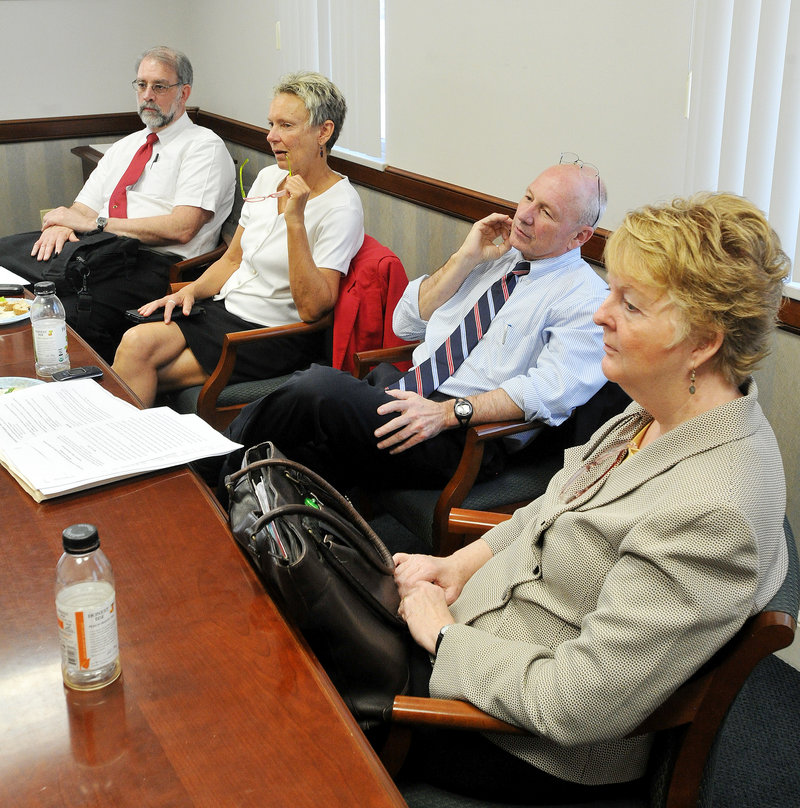AUGUSTA – In the battle over Gov. Paul LePage’s proposed cuts to Maine’s General Assistance program, Portland Mayor Michael Brennan is playing a leading role in the opposition. He’s communicating regularly with the Portland delegation, speaking at hearings in Augusta and helping organize a coalition with the mayors of nine other Maine cities to pressure lawmakers.
In the past month, he has also opposed two LePage bills to expand school choice, both of which were rejected last week by a legislative panel, and has secured state funding and an accelerated timetable for the $280,000 project to dredge the city’s cruise ship berth.
For those who supported the idea that Portland should have an elected mayor, Brennan’s work this legislative session is seen as validation.
“What we hoped would happen is happening,” said Pamela Plumb, who headed the city’s Charter Commissioner two years ago when it created the new position of an elected, full-time mayor.
What the Charter Commission had hoped for was that a full-time mayor, among other things, would be better able to advocate for the city’s interests with the federal and state governments.
Portland voters last November appeared to buy into that idea, choosing for mayor a candidate who is a familiar figure in the State House. Brennan served in the Maine Senate between 2002 and 2006, including a session as Senate majority leader.
In the old days — between 1923 and 2011 — Portland’s mayor was selected by the City Council for a one-year term. The job was largely a ceremonial one, paying $7,195 a year. Mayors typically held day jobs.
Brennan, who is paid a $65,400 salary, works full time as mayor, typically six days a week. He has an office in City Hall near Council Chambers.
In truth, Brennan doesn’t really have much more legal authority than any of the other eight members of the City Council. Rather, what power he has stems from the moral authority of winning a citywide election and the ability to use his time to develop relationships and coalitions.
Brennan appears to be doing just that.
Last Thursday, for example, he spent all day in Augusta, arriving in midmorning for a news conference with other mayors announcing the new coalition and leaving well past 7 p.m., after an impromptu discussion outside the State House with a lobbyist representing a Portland methadone clinic.
In between, he had a lunch meeting with other mayors to discuss strategy, met with lawmakers and lobbyists and spoke at a public hearing.
He also met privately with Bangor Mayor Cary Weston. Among the topics was whether Bangor should follow Portland’s example and create the position of a full-time, elected mayor.
A Bangor City Council committee on Tuesday will discuss the issue, which is being promoted by a group of community leaders.
Weston, who is president of a public relations and marketing company, said Brennan has shown the advantage of having the mayor’s post be his day job.
“When you are a part-time anything, it puts a strain on your ability to be all-in for the good of the community,” Weston said.
Brennan on Thursday spoke with several lawmakers. He talked about the General Assistance cuts with Rep. Peggy Rotundo, D-Lewiston, who sits on the powerful Appropriations Committee. With Sen. Dick Woodbury, I-Yarmouth, who serves on the Taxation Committee, he spoke about a bill that would increase revenue sharing to cities.
With Rep. David Webster, D-Freeport, who also serves on Appropriations, he discussed a budget proposal that would put restrictions on the ability of MaineCare clients to get methadone treatments for drug addition. Brennan worries the cutbacks will cause addicts to commit crimes to get money for illegal drugs.
He later spoke at length about the General Assistance cuts at a public hearing of the Legislature’s Appropriations and Health and Human Services committees.
Brennan also twice spoke on his cellphone with Sen. Justin Alfond, D-Portland, about two bills that would expand school choice that the Education Committee was voting on that day. Brennan opposed both bills, arguing they would hurt Portland’s pubic schools.
Today, Brennan and several other city councilors will return to Augusta to meet with Portland’s 10-member delegation. Brennan has been holding these meetings every two weeks, alternating the meeting locations between Portland City Hall and the State House.
Compared to past years, the meetings are now more frequent, better organized and better attended, Alfond said.
As a result, the ability of the delegation to work together for the city’s interest has improved considerably, he said.
Brennan, for example, alerted the delegation to the opportunity to get state funding for the dredging project, and he also worked to move up the project schedule so it would not interfere with the cruise ship season, Alfond said.
“That all got turned around in a matter of weeks because of Mayor Brennan,” he said.
While Alfond credits Brennan’s State House experience, City Councilor John Anton said that Brennan’s full-time workweek has enabled him to increase the level of coordination between the City Council, city staff and the delegation.
“The mayor has the time and energy to make that happen, and it has energized other councilors,” Anton said.
Of course, Brennan has been mayor for only three months and is still enjoying a political honeymoon. He has yet to deal with the city budget, a contentious process that begins when City Manager Mark Rees submits his budget next month.
While Brennan is well-versed in big policy issues that dominate Augusta, he acknowledged that he is still learning about the “nuts and bolts” of how municipal government works, such as trash disposal, parking enforcement and role of the Planning Board.
He said he is relying on the experience of Rees, city staff and members of the City Council. He said the Charter Commission was wise to designate the city manager as the city’s chief executive with the responsibility of running the city’s day-to-day operations.
He says his honeymoon period will likely end this spring, when hard choices will be made over the city and school budgets.
People’s expectations for him are high, he said, and he wants to live up to them.
“People want the mayor’s position to be successful, and they want me to be successful,” he said.
Staff Writer Tom Bell can be contacted at 791-6369 or at:
tbell@pressherald.com
Twitter: TomBell Portland
Send questions/comments to the editors.




Success. Please wait for the page to reload. If the page does not reload within 5 seconds, please refresh the page.
Enter your email and password to access comments.
Hi, to comment on stories you must . This profile is in addition to your subscription and website login.
Already have a commenting profile? .
Invalid username/password.
Please check your email to confirm and complete your registration.
Only subscribers are eligible to post comments. Please subscribe or login first for digital access. Here’s why.
Use the form below to reset your password. When you've submitted your account email, we will send an email with a reset code.